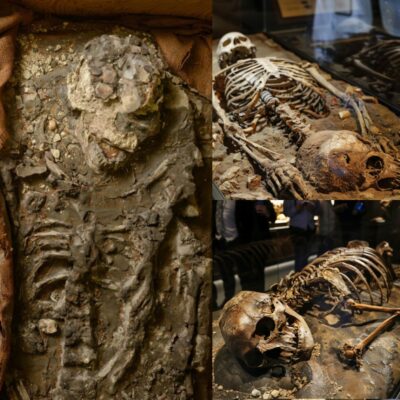If you come across cloudy and trembling eggs in the middle of the forest, don’t run away but sit down and admire the scene of the “demon hand” emerging from them. Not everyone in this world is lucky enough to see it!

In 2015, a post by a Twitter account named Dan Hoare caught the attention of many netizens with a curious caption: “Alien monster eggs hatching in New Forest (US)”. Accompanying the post were several photos capturing the scene of something resembling an octopus emerging from these cool-looking eggs, resembling a scene from a science fiction movie about extraterrestrial creatures!

This “octopus beard” will bloom in a spectacular way, reminding everyone of a hand reaching up from hell. However, you don’t have to be afraid because it’s just a harmless type of mushroom!

This mushroom is scientifically known as Clathrus archeri, also called the stinkhorn octopus mushroom (Octopus Stinkhorn) and has an even more impressive alternative name: “Devil’s Fingers”. When it first “grows”, it will have a shape resembling an egg, and then the shell will “crack” open, revealing its red tentacles resembling octopus arms, spreading out into 4 – 8 bright red branches, just like devil’s fingers reaching out from the ground. These “fingers” are covered in a slimy blackish-green substance containing spores and emitting a putrid odor that attracts flies to help spread the spores everywhere.

According to Kathy Hodge, a mycologist at Cornell University, the devil’s finger fungus spends most of its life underground and only emerges when it’s time to reproduce. They typically grow in clusters on moist ground, among decaying wood or around tree roots and fallen leaves. With their bright red color, they are easy to spot and identify.

It is known that the octopus stinkhorn mushroom, also known as the devil’s fingers, originates from Australia and New Zealand. It was introduced to Europe during World War I. The mushroom was first discovered by the British in 1946 and then in 1999. Over 20 years later, when everyone thought that this species had become extinct in England, researchers discovered it again. In 2019, the Avon Wildlife Trust, a wildlife conservation organization in England, unexpectedly found the rare devil’s fingers mushroom in a wild nature reserve in the city of Bristol.

Despite having a appearance that “scares the world away”, the octopus stinkhorn mushroom is actually harmless to humans. It has some relatives that look almost identical in shape, but contain deadly toxins. One such mushroom is the Podostroma Cornu-damae, which looks like a human hand, and another is the Xylaria polymorpha, which resembles a dead man’s finger.

Xylaria polymorpha typically grows to a height of 3-10 cm with a diameter of 2.5 cm. The mushroom has a hard stem, a round head, and usually grows in the spring. In its early stages, this type of mushroom has a white head that looks like a human fingernail. However, as it reaches the end of its life cycle, the Xylaria polymorpha begins to turn black and rot. At this stage, the mushroom contains toxins that can be deadly to humans. This mushroom species often grows in gardens and any damp areas such as decaying wood, moss, under rocks, etc. and not just in forests, so it can be dangerous if not handled carefully.














